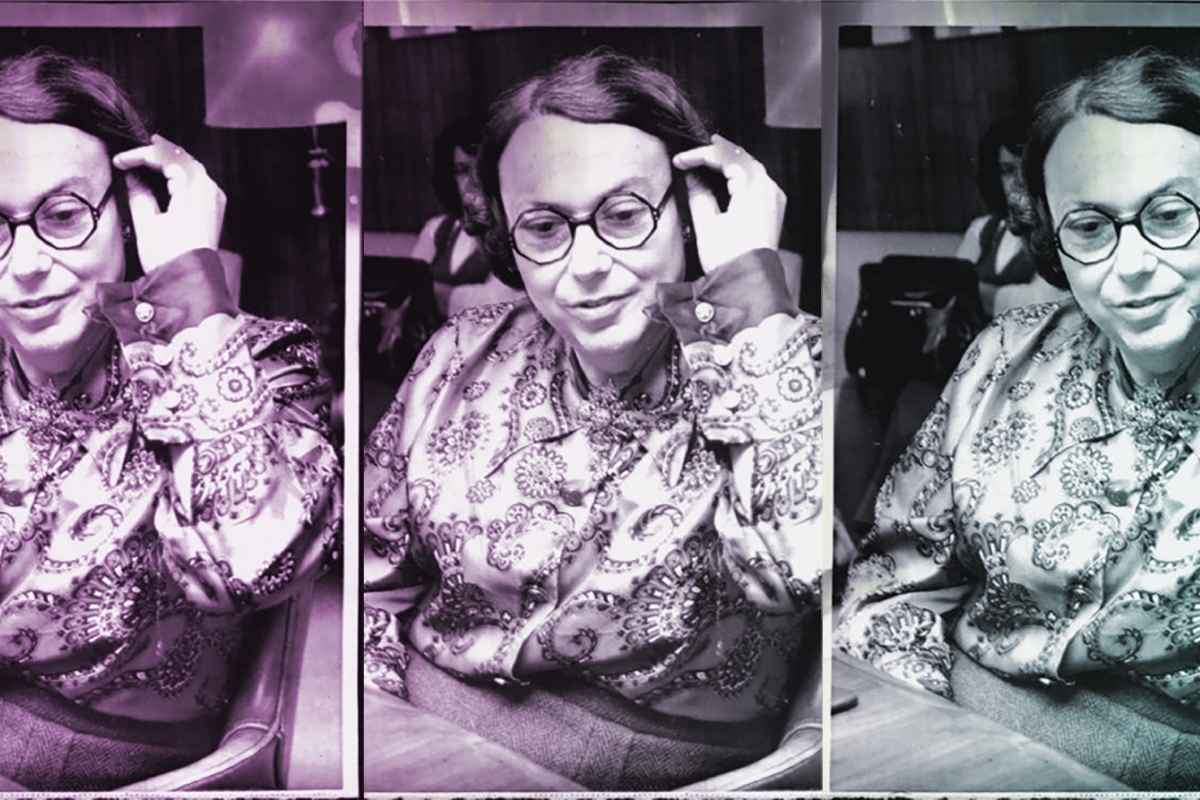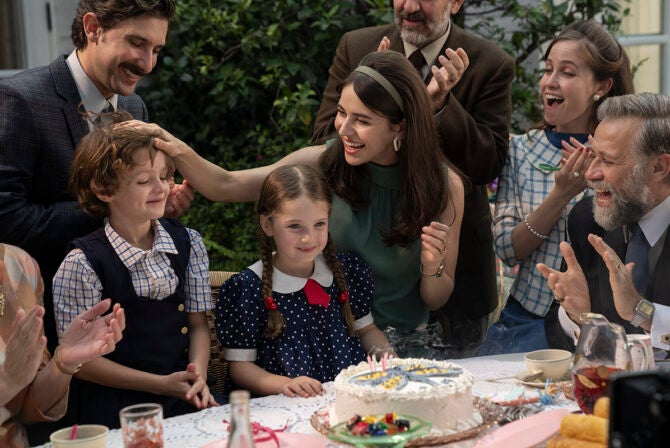I found out about Paula Grossman while listening to one of my favorite podcasts, “Death Sex and Money.” In a wonderfully touching episode, host Anna Sales interviews Bernie Wagenblast, a journalist and voiceover artist whose voice has helped me, and millions of New York Subway users, through many a ride — letting us know when the next train is arriving on the platform.
Bernie, who recently came out as trans, talked about her early days realizing that she was a woman while growing up in New Jersey. As puberty set in, Wagenblast realized that she wasn’t in the body she was meant to be in. She felt isolated, aside from one person.
“There was a teacher in a nearby town who had transitioned, and I looked up her address in the phonebook,” Wagenblast recalled on the podcast. That teacher was Paula Grossman, and Wagenblast read about her in the newspaper, where she had made the news — and history — for suing the Basking Ridge, New Jersey elementary school where she worked.
Desperate for kinship, Wagenblast sent Grossman a letter telling her about herself, and then they “made arrangements for her to call me at a payphone.”
Wagenblast wasn’t sure there would even be a voice on the other line, but there she was, on a payphone, in the middle of the night, sharing for the first time the way that she felt. “I have to give her a lot of credit because I was a minor. She was taking a risk. She was fired from her job because she had transitioned,” Wagenblast recounted. “But it was so helpful to me, to have someone I could confide in.”
“Paula Grossman got a letter from a 13-year-old and called the payphone when you needed her to, that’s just beautiful,” Sales mused.
Wagenblast told Sales that she regrets that she “never had a chance to tell her how much she meant to me.”
Paula Grossman was truly amazing, and Bernie wasn’t the only famous voice she touched. In one interview, Grossman talked of the many letters she got after her case made international news, and even brought her to the Johnny Carson show. “Some of the letters would break your heart and they always close with a plea ‘please for God’s sake, help me,'” she said. “The worst part of this problem is that you are terribly, terribly alone,” she added. “It is a problem of simple justice and freedom.”
Born in Brooklyn, Grossman was a World War II vet who settled in Plainfield, New Jersey, with her wife, Ruth Keshen, a legal secretary.
Grossman was a teacher for over 30 years when she transitioned, and had spent 14 years teaching music at Cedar Hill Elementary School in Bernards Township. When she had her gender confirmation operation in 1971, and asked to return to school and teach, the school board refused her, saying it would have a “negative impact” on the students. She was suspended from the tenured teaching post she had, and asked to take one at the town’s high school instead, where, one student surmised, she would have probably been fired from soon thereafter.
With the help of the ACLU, Grossman sued her school board in 1971; she was willing to take the case all the way up to the Supreme Court, but she finally had to admit defeat in 1974. Still, the case made national news, and Grossman, one of the first women to publicly transition in the U.S., was even the subject of a story in the New York Times.
“It was a day much like any other day in the life of Mrs. Paula Grossman: A hormone shot at the doctor’s. A lunch of three hot dogs at Opdyke’s Charcoal Grill, her favorite roadside restaurant. A trip to a country market to buy 15 dozen eggs wholesale,” that article opens.
Even in 1973, when a reporter wanted to, as so many do today, make being transgender or queer all about sex, Grossman refused. “Mrs. Grossman frowned when asked about her sex life with her wife. ‘I never discuss it; it’s in bad taste,’ she said firmly,” the article reads. What a legend.
Grossman was also a rare case at the time, because, until her death, she remained with her wife and raised their three daughters together: oldest daughter Myra, and twins Carol and Claire, who were still in high school when Grossman had her operation.
Early on, she told her girls, “I have an unusual problem. Occasionally, I feel better when I dress in women’s clothes. But you should not take it seriously, because it means nothing to you or my feelings toward you.”
“If you not only love each other but like each other most problems are surmountable,” she told Central New Jersey Home News.
What Grossman had to say about the parents’ and school boards’ outrage about her transition is just as relevant and true today as it was then. Grossman noted they were “far less concerned with the effect on their children than with social inconveniences.” She questioned what lessons were taught to those children who saw her not return to school — what they learned about “the limits of personal freedom” and “how very little individual differences are tolerated in our society.” She said in 1972, “I know my presence in the classroom will not hurt a child an iota.”
“I had no choice, it was either do this or die,” Grossman, whose wife found her with a revolver in her hand on multiple occasions, told The New Jersey Courier-News in 1974 when speaking of her transition. “It is a medical problem, not a moral disease.”
“I still don’t feel like the case for transexuals is lost, even though it is lost for me,” she added.
Grossman kept working as a musician, performing at nightclubs around New Jersey, and she brought the joy of music to so many while educating people about being transgender and writing a book titled “A Handbook for Transexuals.” She became a community service planner in her hometown of Plainfield.
In 1974, it was ruled that Grossman would receive a disability pension. According to the appellate division of the superior court in the New Jersey, “her sex change operation had resulted in a physical incapacity to teach.” But, as one famous student of hers said, “She was disabled only by the small minds of the school board.”
That student was Meryl Streep. In 2017, when Streep was awarded the National Ally for Equality Award by the Human Rights Campaign, she called Grossman “one of the bravest people I know,” someone who dared to be different in a world where that would mean “drawing a target on your forehead.”
Streep recalled how, on a school trip before she transitioned, Grossman took her class to see the Statue of Liberty. There, they sang the words of Jewish poet Emma Lazarus, engraved at the feet of the monument. All those decades later, Streep got up and beautifully sang the melody Grossman taught her.
“I can’t remember what I did Tuesday, but I remember that song,” she recounted as the crowd cheered. “It stirred my 11-year-old heart then, and it animates my conscience today.”
“She was a terrific teacher,” Streep added, saying Grossman set the stage for discrimination cases that followed.
“The message I leave is to stand up and buck the whole world if you have to to do what you think is right. A lot of people have followed my example,” Grossman told the New Jersey Daily Record in 1977. “My case came 19 years after Christine Jorgensen,” she said, referring to the person widely known as the first openly trans American, “but many came soon after mine. That is my contribution.”
“Paula was a third generation American Jew and proud of it,” her cousin Rabbi Mark Sameth, who has written a book about the dual gender in God’s name, told Kveller over e-mail. “Her maternal grandparents, members of Ansche Chesed on the Lower East Side, emigrated from Germany before the Civil War, and her maternal grandfather cut button holes for the Union army uniforms.”
“In important ways, Paula was a pioneer,” Sameth added.”Although the CCAR would not pass its Resolution on Advocating for Transgender People until 20 years after her death,” Sameth said, “Paula lived to see a sea-change in attitude in the Jewish world.”
Grossman passed away in 2003. She had been a member of her local Reform congregation with her wife Ruth, and took on the middle name Miriam — the fierce Jewish heroine, who according to lore led the women across the parted Red Sea with her timbrels, was a perfect choice, both for someone as wonderfully musical as Grossman, but also for someone who paved the way to make the world more just for all.
Paula’s vocation may have been taken from her, but it’s clear that she accomplished what every teacher dreamed of — she made lasting impressions on young minds that helped make the world a better place. She helped a teenager feel seen when she had no one. She left a song in the heart of one our nation’s most iconic actors. And even though she never went back to elementary school to teach young children music, she did help enlighten so many about what it means to be transgender. In all likelihood, we probably know just the peak of the iceberg of difference and change Paula Grossman made in this world.
May her memory be, always, for a blessing, and in these fraught times for transgender rights across the nation, may it be for a revolution, too.








